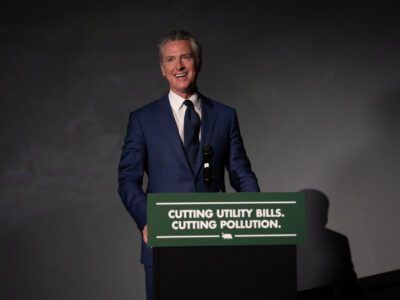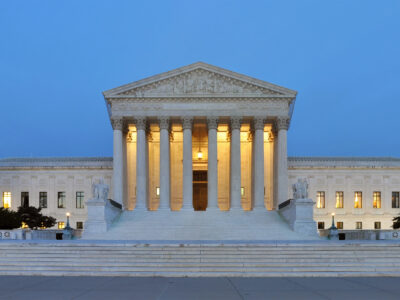Default and the Environment
What are the environmental impacts of Uncle Sam’s failure to pay his debts on time?
A journalist asked me how a default might impact environmental law. As I thought about it, I realized that the answers were, “In one way, very little,” and “In another way, potentially a disaster.” The effects might not amount to much. Or we could be talking about multigenerational climate impacts. There’s a lot of uncertainty baked into the second answer– thus “potentially” disastrous rather than definitely or even probably so.
The “very little” answer refers to the direct effect. A default would mean that the government wouldn’t have the funding to pay all its debts immediately. So debts would have to wait in line until enough tax revenue came in to pay them one by one (as I understand it, in the order that Treasury receives the payment requests). Some of those payments would go for environmental grants or contracts. The delay would be a nuisance, but unless the default continued for a long time, the delay wouldn’t be a serious problem. The grantees or government contractors would still get their money.
The “disastrous” answer refers to the risks posed by the possible ripple effects of default, and the possible ripple effects of those ripple effects. Those could get progressively more serious the further out we look.
None of this could turn out to be relevant. Republicans are said to be feeling optimistic about a deal this morning. If a deal does emerge, we can put all the worries about default on the shelf — at least until we hit the new debt limit ihn a few years.
The economy. Let’s start with the first set of ripples from default, the economic ones. At the very least, there would be short-term turmoil in the financial sector. Uncle Sam’s credit rating would be downgraded, which means that investors would have to rebalance their portfolios and banks would have too increase. Since this hasn‘t happened before, we don’t know how bad the turmoil would be. But things could get crazy, since one of the bedrock assumptions of the financial sectors would be upended – that being the risk-free nature of U.S. government debt.
In any event, if they had to increase their reserves, banks would be able make fewer loans, which puts the brakes on businesses generally. Corporations might also hold off from making new investments until they saw which way the wind was blowing. That could start a snowball effect.
Macroeconomics is something of a dark art, in which theories abound and data is inconclusive. The experts seem to think that a recession is likely, perhaps a very serious one. They might be right in their theories. Or even if the theories are wrong, this could be a self-fulfilling prophesy as businesses assume that a recession is coming and that they need to head for the exits.
Assuming that there would be a fairly serious recession or freeze-up on new investments, that would be a really bad thing just when we’re trying to quickly revamp a major sector of the economy. If investment freeze up, it’s going be hard to build all those new EV and battery plants, solar and wind farms, and transmission lines. Tax credits and grants that are already on the books will help, but they may not be big enough to induce companies to take the risk of major investments.
The result of a default-driven recession: the energy transition is put on hold while carbon emissions from fossil fuels continue — emissions that will stay in the atmosphere warming the planet for two hundred years or more.
There are some uncertainties here beyond whether or not we have a recession. Emissions could be somewhat lower temporarily because of the decline in energy use in an ailing economy, but this is probably less significant than the recession’s impact on clean energy investment. And the government’s response to the recession could also matter.
If the government directed stimulus funding to the clean tech sector, that could also make a difference. On the other hand, depending on who is in power, we could see a rollback of existing climate policies.
That brings us to the topic of political ripple effects.
Domestic politics. If it’s hard to predict the economy, it’s even harder to predict politics. If there’s a recession, the question is who gets blamed and who benefits.
In one likely scenario, the answers are Biden (blame) and Trump (benefit). Biden gets blamed because he’s the President, and he’s supposed to take care of the economy. Trump benefits because he’s Biden’s clearest opponent and because the recession raises the level of disaffection and anger in the country, which is to Trump as blood is to Dracula.
We’ve seen the harm to environmental policy he can do in Trump’s first term. A second term would be at least as bad and probably worse. Of course, it’s also possible that the Republicans would get blamed for sparking the crisis, strengthening the Democrats politically and opening the door to stronger climate policy. Unfortunately, a lot of pretty sensible political commentators think the “Blame Biden”scenario is more likely. That could well put Trump back in the White House.
International repercussions. Even in the scenario where there’s no serious economic fallout, default will tell the world that the U.S. is too politically dysfunctional to even take care of basic government functions like paying the debt. Under Biden and Obama, the U.S. played a positive role in international climate negotiations. It could be harder to continue playing that role — and exponentially harder after a possible second Trump term.
If there’s a serious recession, it’s unlikely to be confined to the U.S. At that point we would have to worry about the political fallout in other countries and whether the effect would be strengthen the hand of Trump-like populists. If Brazil fell back under Bolsonaro’s spell, for example, the Amazon forest would literally be on the chopping block. And all that carbon gets released, with multi-generational impacts.
That’s the “potential disaster” scenario, not just for the direct victims of the recession but for later generations.
Uncertainties. But as I said at the beginning, there are real uncertainties about this. After all, the U.S. hasn’t defaulted before, so we have no direct experience to guide us.
A lot of this hinges on the economic impact of default. Maybe we’ll get really lucky — the U.S. defaults and the financial world rolls with the punch. As a result, the ripple effects are milder, as hopefully are the political effects. That could happen — after all, in the long run, the U.S. is good for the money.
One positive sign is that we’re only a week from possible default and markets aren’t freaking out, so maybe it really isn’t that big a deal. (In which case, Biden shouldn’t be willing to give up much to prevent default, either.) In that scenario, default become just another pressure point, like government shutdowns, that give Republicans some leverage that they periodically use , with bad but not catastrophic consequences when the trigger is pulled.
On the other hand, I’m not full of faith in the likelihood that financial markets will be governed by long-term economic fundamentals. (Remember 2008?) The fact that markets haven’t shown a big response may simply mean that they’re taking it as an article of faith that default can’t happen. In that case, they might be all the more shocked if not panicked if default does happen. And let’s face it, default would mean that even without Trump ‘s direct involvement, our politics have reached a new level dysfunction and instability. That in itself poses systemic risks.
What are the odds that we’ll actually see a default? Of the two major credit agencies, Moody’s says it’s confident that there won’t be a default because there’s never been one, while Fitch put the U.S. on a “negative watch” yesterday. We’ll know by early June.
Reader Comments
One Reply to “Default and the Environment”
Comments are closed.







Dan, with all due respect for your continuous efforts and dedication to protect and perpetuate an acceptable quality of life for the human race, you forgot to point out the Durant’s Lessons of History that threaten us more than ever before today, especially the fact that politicians and intellectuals can destroy our civilization by failing to meet the challenges of change.
Such as politicians who enable the gun deaths of 1000s of U.S. children and teens under 18 per year so that politicians can receive more money from gun manufacturers:
https://www.pewresearch.org/short-reads/2023/04/06/gun-deaths-among-us-kids-rose-50-percent-in-two-years/
And academics who marginalize other intellectuals such as two time Nobel Prize winner Linus Pauling who was margninalized by the UC establishment for jeopardizing military-industrial funding during the Viet Nam War (where we lost about 60,000 Heroes who sacrificed their lives for American Democracy) because he championed Peace Protests:
https://www.latimes.com/archives/la-xpm-1996-02-08-ls-33798-story.html
So the human race has already been in gravest jeopardy and a default would be just one more thing, but The Power of Moncy (even Eisenhower pointed this out relative to military-industrial money) is the worst threat that is destroying our environment and threatening our civilization today.